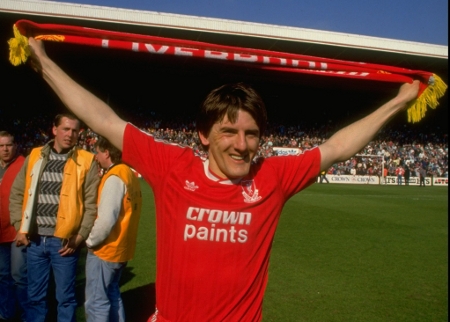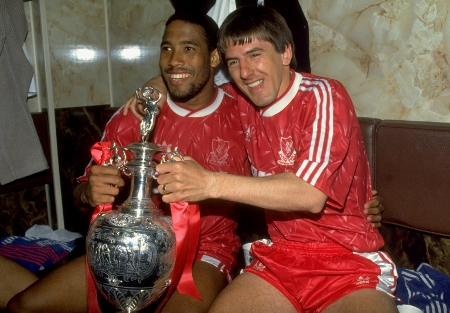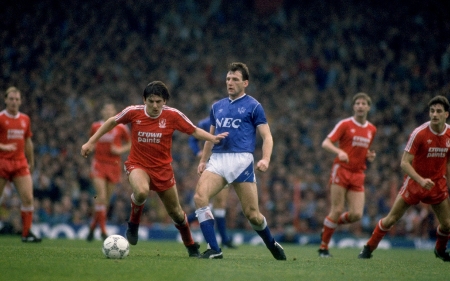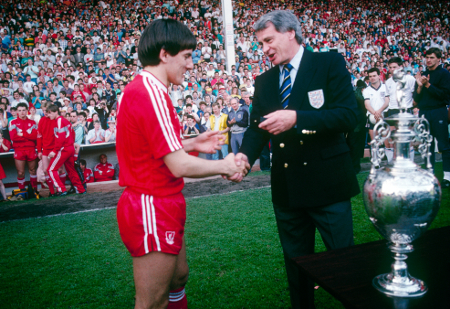- Home /
- News /
- Latest News /
- Peter Beardsley: The big interview
After facing Gerard Houllier's Aston Villa on Monday night, Liverpool could well come up against a team managed by another Kop icon this weekend.
Following the departure of Chris Hughton, Newcastle have placed Peter Beardsley in temporary charge at St James' Park.
The former England international remains revered on both Tyneside and Merseyside, having turned out for the Reds and Newcastle with distinction, as well as Everton, during a glittering playing career.
In his four-year Anfield stay, the twinkle-toed playmaker made 175 appearances for Liverpool, scoring 59 goals and winning two league titles and the FA Cup.
In 2009, LFC TV conducted an in-depth interview with Beardsley in which he recalled the highs and lows of his Reds tenure, speaking candidly about his relationship with Kenny Dalglish, the Hillsborough disaster and his transfer to Goodison Park.
Lots of Liverpool supporters will have happy memories of the 1974 FA Cup final - a 3-0 win over Newcastle. Do you remember that for different reasons?
I remember it very well. I was 13 then and obviously it was a sad day - but it was a great day as well. As a 13-year-old, I don't think you are as depressed after a defeat as an adult is, where they have more of an understanding of what is going on. I was just happy Newcastle were in the final. For Kevin Keegan to score two goals was brilliant for me - he was one of my heroes growing up. In a funny sort of way it was amazing because I ended up playing with Keegan and Terry McDermott, who played for Newcastle that day. It's amazing when you get the chance to go on the same field as two people like that because they were two genuine superstars both for Liverpool and Newcastle.
How did you first learn of Liverpool's interest in signing you?
It was through one of the scouts that still works for the football club - a fellow called Alex Smailes. Alex had been a big part of Liverpool's history. When you look at the amount of north-east players that have gone that way, he's been involved in all of them and he was involved in my transfer. He asked me would I be interested in going to Liverpool but he only asked me after I'd been told Newcastle were ready for me to go.
Willie McFaul, who was the manager at the time, called me in. I had two years to go on my contract at Newcastle and he told me they wanted me to sign a new one. I said to Willie: "I don't want to sign tomorrow. I'm happy and I've still got two years to go. All I want is the club to show me the ambition of what they are thinking of doing." He said: "If you're not going to sign, we're going to sell you." Then he told me Liverpool were interested.
I got the chance to speak to Kenny Dalglish, and for me to take over from 'God', as I call him, in terms of the No.7 shirt was just the greatest thing ever - especially when you consider Kevin Keegan wore it and then Kenny Dalglish, probably the best No. 7 they ever had. It's a special shirt and probably always will be because of those two. For Kenny trusting me to wear his shirt, it wouldn't have mattered if they had said 'We'll give you a pound in wages.' I would have done it. Genuinely.
Is it fair to say that Liverpool were perhaps one of the few clubs you would have left Newcastle for?
It's easy to say in hindsight, and people will say 'He's only saying that', but it was the only club - and I mean that genuinely. I had already been to Man United and failed. Without being disrespectful to other clubs, Liverpool were the biggest and the best then. John Barnes was already there, a big mate of mine through the England set-up. Aldo had come in just before that and Ray Houghton came straight after me. It was brilliant because Kenny obviously had a lot of great players and great friends in that team, but he was in the process of re-modelling the team. To be part of what he thought was the next era was a special thing.
How did you cope personally with being labelled as 'Britain's most expensive footballer'?
For the first six months, shockingly. I have to be honest, I was awful. The Liverpool fans would be really nice and say I hadn't played that badly. For the first six months of my Liverpool career we went 29 games unbeaten and it was an unbelievable team to be in. They had players like Alan Hansen - a dream as a captain in every respect, on and off the field - as well as Barnes and Aldridge, who could score for fun. The atmosphere around the club at the time was really special. Mark Lawrenson took me under his wing and both he and Bruce Grobbelaar really looked after me.
Initially in the dressing room, there was a lot of mickey taking, though not in a horrible way - 'You don't get much for £2m nowadays.' At the end of the day, they want you to succeed but the banter was there and it's almost like a mental test - can you get through it?
I have to be honest, there were times when I thought, 'I'm having a shocker here and I don't know what to do to get out of it.' But because the rest of the team were performing so well they could almost get away with carrying one player. They carried me, certainly for the first six months, and then I managed to score a couple of goals against Coventry and never looked back.
In the second half of the season, I scored 15 goals but I had only scored three before Christmas. I was lucky that everything just fell into place. I ended up scoring the goal that actually won us the league that season - we played Tottenham and beat them 1-0. It's funny how football just does that to you.

When you arrived at Anfield you were already an established England international, but was it still daunting to walk into Melwood on that first day?
Absolutely terrifying, but the fact that John Barnes was there was a big help. If he hadn't have been there it would have been a nightmare. I came down to Liverpool and had discussions with Kenny but there were no agents in those days. I went in to see John Smith and Peter Robinson, who were two special people. I sat down and their chairs just seemed seven feet tall - I felt as though I was sitting on the floor, I was so scared and nervous.
John Smith said: "What are you looking for?" Kenny had already told me what to say - 'I'm going to wear the No.7 shirt, take it over from your manager, and it's the best club ever.' I did all that and he said: "No problem."
Then he said: "If we sign a player next week and he ends up getting more money than you, don't come knocking on the door saying you want more money." And I never did. I never would. At the end of the day that's personal.
You get rumours at football clubs. Look at it now - everybody's guessing what Steven Gerrard or Fernando Torres gets. Whatever they get, they deserve every penny. At the end of the day they are the best and if Liverpool can afford to pay them then they will do that. To be fair to Liverpool they have always been like that.
So many Liverpool supporters have great memories of that game against Nottingham Forest from 1987-88, the 5-0 at Anfield. You scored in that game - you must have special memories of that night as well?
It was incredible - one of the best nights of my football life. John Barnes was sensational - the best player I ever played with. In my first two years at Liverpool, he was the best player I've ever seen bar none. Particularly in that game.
Tom Finney was at the match and said it was one of the greatest ever games. It was great because Nottingham Forest were a good team at that time with players like Stuart Pearce and Des Walker, but some of the things that John Barnes did on the night were unbelievable. I was lucky because I was with Barnesy for four years at Liverpool. In terms of enjoyment and being around a person, it was the best four football years of my life I have to say.
We won the league title that first season with five games left to go - it was fairly straightforward.
How do you reflect on the FA Cup final of that year against Wimbledon?
It was great to play in a cup final, that's why I went to Liverpool. Liverpool won the league most of the time back then. My dream was always to play in an FA Cup final. As a kid, growing up, I always wanted to play at Wembley. The chance to get to do that in my first season, and meet Princess Di, was unbelievable. I remember coming out into the tunnel and people like Vinnie Jones and John Fashanu were having a go at us, but that's the way Wimbledon were. To be fair to them, on the day you would have to say they deserved it.

A lot of the former players talk about the role of Roy Evans and Ronnie Moran and how after successes with Liverpool they used to say throw your medals in the bin and start again. Was that the same after a defeat like Wimbledon - success and failure dealt with in the same way?
Absolutely. That was the great thing about Liverpool as a club in those days. They obviously had brilliant history and traditions, but they had an uncanny knack of bringing you back down to earth in a nice way. You do have to move on. Alan Hansen - who was a fantastic player and a great skipper - was the same. He obviously had a lot more medals than I had, but I was like a little kid in a sweet shop when I won my first one! I didn't want to put the medal anywhere, I just wanted to keep it in my hand and look at it.
That is what you play football for. When you look at people like Steven Gerrard and Jamie Carragher now, the fun they must have had in Istanbul! That is the thing about winning trophies - you cannot buy that feeling, that elation. It is really special.
What do you remember of Hillsborough and how have you coped in the 20 years since?
I found it hard but I don't think I was hit as hard as Kenny and Marina Dalglish, or John Barnes. On the day, after about four-and-a-half minutes, I hit the bar. At the time I was annoyed because I probably should have scored, but then when I turned around and saw what was happening at the far end I was glad I missed. I didn't realise how severe it was at the time but had I scored, there could have been even more loss of life.
The families were incredible. Everybody said about how nice we were, but the way they were to us was unbelievable. Kevin MacDonald and I went to a funeral in Burnley and the family couldn't have treated us any better. In a way, we were almost embarrassed to be there because it was nothing to do with us in terms of their family. But they almost made us part of the family. That is something that will always live with me.
I have to be honest, I only went to one funeral because I found it really hard. There are no excuses, I probably should have gone to more but I just couldn't cope. I just wanted to get back to playing football so I actually went to play for England. I was given the option but I just wanted to get back on the football field.
The way Kenny and Marina were in that time was unbelievable. I love the man anyway but that just made him go up in my estimation even more if that's possible. He must have gone to 70 per cent of the funerals, sometimes three or four a day. Recently there was talk about him being knighted. I think he should be knighted for his football ability anyway, but if you put the two of them together he should definitely be knighted.
I guess you must look back on the FA Cup of that year and say you had to win the trophy for the supporters - for everything the club went through in 1989?
It was almost the perfect end. For red and blue to be stood all around that Wembley Stadium without the hindrance of fences was just amazing. No disrespect to Everton, it was disappointing for them to lose but when I look at people like Graeme Sharp and Kevin Ratcliffe, who I got to know when I went to Everton, even they were almost happy for us to win that game. They were sensational. The way they rallied round was incredible and it couldn't have happened in any other city the way it did. It is a special city in world football and doesn't get the credit it deserves.

Did you just run out of steam that year? Is that why things didn't work out in the league?
Possibly. But credit to Arsenal, the run they went on was absolutely brilliant. On the Tuesday night after the Cup final we ended up winning 5-1, when 2-1 would have meant we still would have needed a point against Arsenal because of the goal difference. But because we scored five on the Tuesday, we could afford to lose by a goal. Had we only have scored two - which it looked like at one stage we were going to do - we then would have needed not to lose at all.
When we were going out it was a feeling like I've never had at Liverpool before. Every game previously we always wanted to win, and always knew we could. With the Arsenal game, whether it was something inside us, we almost thought, 'We can afford to lose here.' I've never been in a dressing room like that in my life before.
I was on the bench for the first 40-odd minutes until Rushie unfortunately got injured. I think, without just being nice, if Rushie had stayed on we definitely would have won the league. He couldn't go on because he was injured but without being funny, Aldo and Rushie were causing them a lot more problems than Aldo and I did when I came on. With three at the back, Rushie's pace going beyond caused them a problem.
How do you look back at that time in your life because your boy was born the day after the game? That must have been right in your mind during the match?
My wife was in hospital while the game was on. She had a dodgy television - her mum was with her holding the aerial. When the game finished, I went in to congratulate Arsenal and then went to the hospital. The next morning, at home on my own, I got a phone call from the nurse. She said your wife is in labour and it won't be too long now. I actually said to her, not knowing the time, 'I'll be there about nine o'clock.' That was two hours from when I got the phone call! When I realised the time I thought, 'You flipping idiot!' She apparently went back into San and said: "Is your husband laid back about this baby?" As it happens I was in there for quarter to eight and Drew came at 10.47.
Obviously football becomes your life. If you are lucky enough to be involved at the level I was then it is your life. But then when your first son comes along it's unbelievable. I obviously wanted to beat Arsenal the night before but I almost forgot about it. 20 years have flown by!
Another title came along in 1989-90. Ronny Rosenthal was brought in by Kenny in that particular campaign. Was Kenny the kind of manager to speak to you guys about recruiting players in your position?
Kenny told me when I first signed for Liverpool: "We will always try and improve the team. If we feel a person can come in and do better, then we do that." I knew the score - I knew that Liverpool would always try and get better players. Ronny Rosenthal had a brilliant start when he came in. He looked as though he couldn't miss, scored hat-tricks and really looked sharp. It was one of those things.
A lot of people in the past - and even now - think I had a problem with Kenny. I didn't. Obviously I wanted to be in the team, but I never had a problem with him. I had a testimonial for Newcastle United and Kenny and Paul Dalglish were invited to play. If I had a problem with Kenny Dalglish, he wouldn't have been playing.
To be fair to Kenny, whenever I wasn't in the team he would always tell me 10 minutes before he named the team. At the time also he had Paul Walsh who was a good player. Walshy was unlucky and probably in a similar position to me in the respect that when I came in, I probably took his place. That's what football was like and you had to get used to it.

You were still scoring goals in 1991. When do you think things started to go wrong for you at Liverpool?
Probably when Kenny left. Nobody still knows the reason but I have my opinion and that is what he did for the families of Hillsborough eventually got to him. I don't mean that in a horrible way because the man was sensational. That is my feeling of it - I might be totally wrong there.
When he decided to go I was stunned. We were going to Luton to practice on the plastic pitch, but Ronnie Moran called a meeting in the dressing room and basically we got told Kenny had resigned. I was gobsmacked.
Why do you think there is this misconception that you and him didn't get on?
I don't know, I really haven't got a clue. It baffles me. I think Kenny would tell you the same. I wanted to be in the team - no doubt about it. But to be fair everybody else wanted to be in the team and that's the way it was. There were never any vendettas at Liverpool.
You wanted to be in the team - of course you did. But there was never a problem if you weren't because we had so many great players. When you look at rotation now, that was probably just the start of it. In those days people didn't rotate. Kenny was probably the first and ahead of his time.
Graeme Souness arrived at the club and a lot of the former players talk about how he perhaps somewhat ruthlessly came in and underestimated some of the potential still left in some of the players. Is that how you saw your relationship with him? Was he fair to you or not?
I wouldn't say he was unfair. What I would say - and I don't know this for a fact - is that he had a preconception of me before and almost made a decision before he came in. I was on the bench from the start. It wasn't as though he saw me play and then made a decision.
At the end of that season, we went out on tour and we played Arsenal in Mauritius and Graeme said at the end of that game: "You show me that attitude that you've just shown tonight, you will be in my team at the start of the season." Without being big-headed, I had always thought my attitude had been the same, but he had never seen me play because he made a decision and the team were going well. They kept winning most games and just missed out on the league.
I came back and always tried my best. But we were in Sweden on a pre-season tour and he called me to see him and said: "Everton want to buy you and I'm going to sell you." I asked him how much for and he said: "It's not up to me to tell you. Howard will tell you if he wants to tell you." I get on unbelievably with Graeme now but I was really disappointed in that. I would never have asked to leave Liverpool.
You're one of the few people who Liverpool and Everton fans look back on with great affection. That must be a lovely thing for you?
It's brilliant. I've been all over the world playing football and I would hope I haven't got many enemies. Whenever I go back to Anfield or Goodison people are brilliant. Whenever I hear the Scouse accent, I ask them 'Red or Blue?' And then they talk about the years that I was there and how good it was. At Everton we weren't a great team but the spirit and everything about it was unbelievable.
You've now moved into coaching with the academy at Newcastle. Would you like to try your hand at a manager's job one day?
I have to be honest, not particularly. I'm not saying I would never do it but I love the academy. The thing I like about working with the youngsters is they're hungry to be footballers. They're not hungry to be millionaires - they want to be footballers. If I get the chance to see a kid go on to do what I did, that gives me such a buzz. We've had a few that have gone through to the first team. We haven't found the next Alan Shearer, but people like Shola Ameobi have come through our academy, and now Andy Carroll and David Edgar.
We don't put pressure on them. They do what they can do and they do it in the right way. We have fun every day and they work hard but ultimately we are trying to get them into the first team. When we do, that's such a great feeling.
How would you like to be remembered by the supporters?
Probably as somebody who always gave his maximum. Obviously you have bad days, but I think the great thing about the Liverpool people is they always knew that I was giving everything on the field. I think that's more why I'm popular - when you look at the skills that John Barnes had or the ability that Kenny Dalglish had, I will never be in their bracket in people's eyes. But people always knew I put a shift in on the football field. For me that is the most important thing when your a footballer. Everything else is a bonus.
Tagged: beardsley , interview , newcastle , peter beardsley
- 00:01 Aston Villa v Liverpool: The Match
- 02:00 Press Box
- 03:00 Aston Villa v Liverpool: The Match
- 05:00 Press Box
- 06:00 Aston Villa v Liverpool: The Match
- 08:00 #LFCWORLD - EP28
- 08:30 Kop Kids
- 09:00 Reds In Europe
- 09:30 #LFCWORLD - EP28
- 10:00 Kick Off
- 10:03 Press Box
- 11:00 Reds In Europe
- 11:30 Kop Kids
- 12:00 LFC News
- 12:03 #TBT: Reds in Europe - Liverpool v Inter Milan
- 14:00 LFC News
- 14:03 Press Box
- 15:00 #LFCWORLD - EP28
- 15:30 Reds In Europe
- 16:00 LFC News
- 16:03 Press Box
- 17:00 Live: LFC News
- 17:15 Goal of the Season 1992-93
- 17:30 Goal of the Season 2000-01
- 17:45 Goal of the Season 1998-99






























